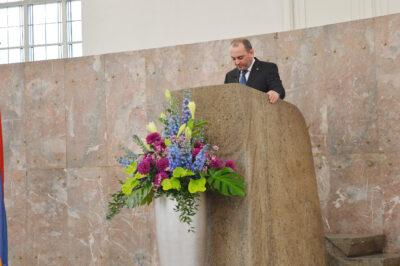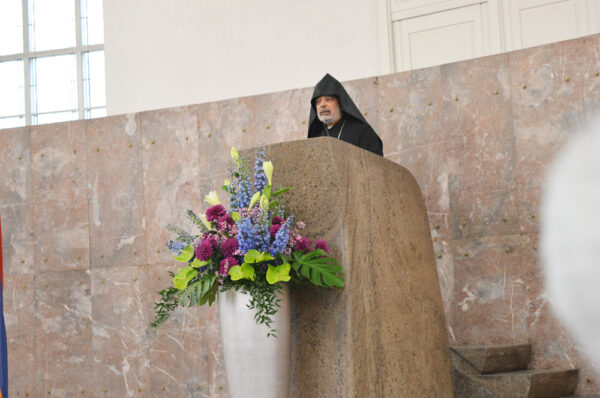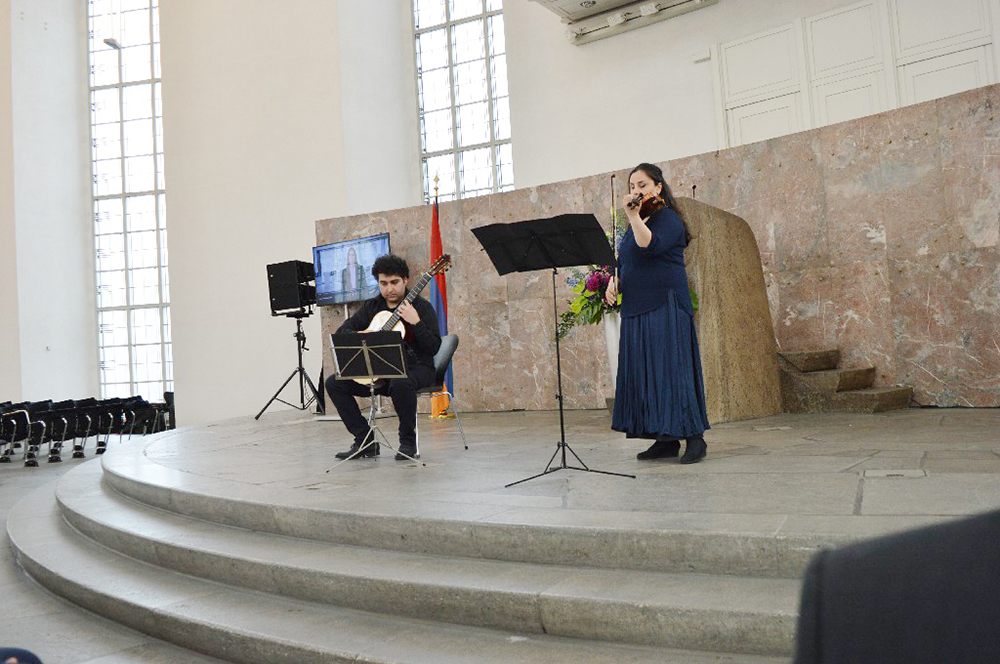
Ambassador Viktor Yengibaryan
German Armenians Commemorate Armenia’s Past Tragedy in a Perilous Present
by Muriel Mirak-Weissbach
Armenian Mirror Spectator
FRANKFURT, APRIL 27, 2023 — It was in the historic Paulskirche (Church of St. Paul) in Frankfurt that the first National Assembly met in 1848 and worked to produce the first constitution for a German republic.
This year again it hosted the International Day of Commemoration of the Armenian Genocide on Sunday, April 23, organized by the April 24th Group, an initiative which includes the Diocese of the Armenian Church and the Central Council of the Armenians in Germany, as well as the Armenian Embassy in Berlin.
Their leading representatives spoke at the event, along with local political figures, Astrid Wallmann (CDU), President of the Hesse State Parliament, Prof. Dr. Roman Poseck (CDU), Hessian Minister of Justice, and Dr. Bastian Bergerhoff (Green Party), City Treasurer, who offered greetings.
Among the numerous guests were members of the Armenian community, the Hessian State parliament, and churches. Jonathan Spangenberg, Chairman of the Central Council of Armenians, cited American novelist William Faulkner: “The past is never dead. It’s not even past,” and thereby set the theme that others would develop.
The fact that Turkey still refuses to recognize the genocide is emblematic, and the continuing conflict, marked by war and renewed Azerbaijani aggression, not only in Nagorno Karabakh but also against the Republic of Armenia, documents the dangers to Armenian national security to the present day.

Bishop Sevropé Isakhanyan
One speaker remarked that the Turkish republic, which celebrates its centenary this year, was founded on the genocide against the Armenians and other Christian minorities. Appeals were made to Germany, whose Bundestag (parliament) recognized the genocide in 2016, and the European Court for Human Rights, which condemned the blockade, to exert political pressure to open the lifeline corridor.
Armenian Ambassador to Germany Viktor Yengibaryan began his speech with reference to the German author and pacifist Armin Wagner, who served as a medic in World War I. Wegner documented the genocide in photographs, an unprecedented tragedy in human history. His testimony showed that the “most important lesson that the world had to learn is that the international community must combine its efforts to condemn and prevent genocide.”
Regarding recognition, Yengibaryan stressed Germany’s 2016 parliamentary resolution and its demand that Turkey “work through the massacres perpetrated and thereby establish the basis for necessary reconciliation with the Armenian side.”
He identified Germany’s own manner of dealing with its past as “exemplary for the whole world.” An important point Yengibaryan raised is that memory culture in the case of the Armenian genocide is not exclusive, but is part of remembrance in human history.

Areg Hakobyan (guitar) and Astghik Matinyan (violin)
And commemorations are important not only for the descendants of the victims, but also those of the perpetrators, as a vital element in the education and development of the next generation. In this respect, he welcomed the fact that some schools in Germany have included genocide studies in their curriculum. The goal is to achieve recognition and reconciliation, the ambassador said, because “reconciliation and peace are the only way to prevent such tragedies in the future.”
Noting the potential today for normalizing Turkish-Armenian relations, he rejected any attempt to exploit the past for revenge, and called instead for making it a “means to build mutual understanding, justice, and solidarity.” This can occur only with mutually acceptable conditions for peaceful coexistence.
Pointing to Armenia’s humanistic and neighborly response to the recent earthquake in Turkey and Syria, he said such courage is required to deal with the past. He, too, pointed to the regrettable fact that the “age of genocides” has not passed, when one considers the 2020 war, and the humanitarian catastrophe created with the Lachin corridor blockade, “an evident example of ethnic cleansing and genocidal actions” against Armenians.
The ambassador closed with a pledge, “here in the bastion of German democracy,” to seek peace and coexistence as the only alternatives. Bishof Serovpé Isakhanyan, Primate of the Armenian Church in Germany, concluded the ceremony with a passionate reference to the message of Easter: Christ is arisen! And, therewith, as St. Paul said, death had been overcome. He compared the experience of the Armenian people with that of Christ, in that its existence had not ended; rather, with the resurrection, life has continued.
Now, a hundred years after the genocide, he said, the Armenian people and state faced immense challenges, as the aggressions against the Republic and in Nagorno-Karabakh awaken the collective memory. Azerbaijan’s intentions to eradicate Armenian culture, to “de-Armenianize” the region must not be allowed to succeed; he called on Germany and all churches to make every effort to end the rhetoric of war and seek a just solution to the conflict.
The ceremony closed with intercessory prayers. Musical offerings interspersed throughout came from the Duo Manima, violinist Astghik Matinyan and guitarist Areg Hakobyan, who performed selections by Komitas and J.S. Bach.